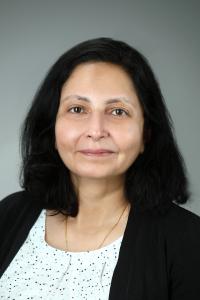
BG 35 RM 2A-1002
35 CONVENT DR
BETHESDA MD 20814
Dr. Mankodi received an MD from Mumbai, India. She completed neurology residency at the Johns Hopkins Hospital. She did neuromuscular fellowship at University of Rochester, NY. Her postdoctoral work with Dr. Charles Thornton was focused on the disease mechanisms in myotonic dystrophy and oculopharyngeal muscular dystrophy. She was appointed as Assistant Clinical Investigator in 2011 and became an investigator in 2014, and later a NINDS Collaborator in 2022. She has received the Thomas J. Preziosi Award for Clinical Excellence in Patient Care at Hopkins and the Henry F. McFarland Transition to Independence award at NINDS. Dr. Mankodi's research goals are to study disease mechanisms and develop treatments in hereditary skeletal muscle diseases.
The goals of Dr. Mankodi's research are to explore disease mechanisms in hereditary adult-onset skeletal muscle diseases with a focus on identifying targets for treatment and characterizing outcome measures in preparation for drug therapies.
Currently, her research is focused on distal myopathies caused by myofibrillar myopathies which are a rare inherited degenerative skeletal muscle diseases characterized by myofibrillar dissolution and abnormal accumulation of degraded myofibrillar proteins. Despite a high proportion of undiagnosed affected individuals, at least 9 genes have successfully been identified. Dr. Mankodi recently discovered that some mutations in LDB3 reside in a region that directly interacts with skeletal muscle actin filaments and causes the disruption of actin cytoskeleton in a splice-isoform specific manner in transfected mouse skeletal muscle cells and in electroporated tibialis anterior muscle fibers of adult mice. Through national and international collaborations, she is uncovering the structure of the LDB3 and skeletal muscle actin interaction using cryo-electron microscopy and x-ray crystallography. With a research team, she is working on developing mouse models of myofibrillary myopathy, which would be important tools in our understanding of underlying disease mechanisms, in identifying targets for treatment and in screening for novel drug therapies.
Dr. Mankodi remains focused on a rare degenerative multisystem disorders with heterogeneous clinical manifestations – myotonic dystrophy (DM). Muscles in the distal leg, hand and forearm are affected early and prominently in DM type 1. She has a keen interest in identifying tools to measure the hand and distal leg function particularly in regards to the effects of myotonia and weakness. She is also developing clinical and imaging biomarkers of pulmonary function in DM1 patients including assessment of diaphragm and intercostal muscles. Through the Myotonic Dystrophy Collaborative Research Network (DMCRN) and clinical studies, she is working with a research team characterizing clinical endpoints, imaging and molecular biomarkers of disease progression, disease mechanism and therapeutic response in DM patients.
